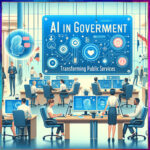The integration of artificial intelligence (AI) across various sectors is accelerating, prompting researchers worldwide to evaluate its profound implications. A recent article by Fitriani, Khodra, and Surendro presents a conceptual framework designed to streamline the adoption of AI in business architecture, particularly through case studies from the higher education and government sectors.
As organizations navigate the complexities of digital transformation, the demand for a structured AI adoption strategy has become increasingly urgent. The authors argue that without a coherent framework, businesses risk a disconnect between their objectives and the capabilities of AI technologies. Their research breaks down key components that help organizations view AI not just as a tool, but as a fundamental part of their strategy and architecture. By detailing their framework, they seek to assist institutions in achieving a transformation that is both technological and organizational.
Case Studies Illuminate AI’s Impact
The research highlights various stages of AI implementation within higher education and government settings. For educational institutions, there is growing pressure to improve student experiences and operational efficiency. By leveraging AI, these institutions are personalizing learning experiences, streamlining administrative processes, and optimizing resource allocation for research. The findings indicate that when AI initiatives are aligned with the broader educational mission, the results are significantly more effective.
In the realm of government, AI integration is equally transformative. The article outlines case studies where departments are utilizing AI for enhanced public service delivery. This encompasses everything from predictive analytics for resource deployment to automated systems that improve emergency response times. However, the researchers stress the critical need for ethical application, especially when dealing with sensitive information or public policy implications.
The Cultural Shift Required for AI Adoption
One of the unique contributions of this research is its focus on change management. The authors assert that adopting AI involves more than just technology; it requires a cultural shift within organizations. Effective leadership is essential to foster an AI-ready culture that prioritizes innovation, adaptability, and continuous learning. This cultural foundation is what bridges the gap between technical implementation and achieving strategic objectives.
The study also addresses the significant challenges organizations face during the AI adoption process. Common barriers include resistance from teams and a lack of understanding of AI capabilities. To tackle these issues, Fitriani, Khodra, and Surendro propose comprehensive and inclusive training programs aimed at enhancing AI literacy among staff, which can facilitate successful integration.
Moreover, the authors emphasize the role of various stakeholders in the AI adoption journey. Engaging IT teams, departmental heads, and end-users is critical to ensure that the AI solutions developed meet the organization’s actual needs. By promoting an inclusive approach, businesses are better positioned to create AI strategies that are both technically sound and culturally relevant.
Practical Strategies for AI Integration
The framework introduced in this research also includes actionable strategies that organizations can implement to effectively integrate AI. These strategies encompass conducting thorough assessments of current capabilities, defining clear visions for AI usage, and remaining adaptable to emerging technologies. This practical dimension is crucial, as it translates theoretical frameworks into tangible actions that organizations can take immediately.
Beyond efficiency gains, the implications of adopting AI present significant economic considerations. The authors highlight that organizations leveraging AI could not only reduce operational costs but also enhance service quality. This interplay between cost savings and service improvement has the potential to reshape competitive dynamics across various industries, prompting organizations to reassess their strategies to maintain market relevance.
As the AI landscape continues to evolve, ongoing dialogue and research will be essential. The dynamic nature of AI technology necessitates that frameworks remain flexible, adapting to new tools and insights. The authors call for a collaborative effort between the academic and business communities to further explore AI applications and continuously refine strategies.
In conclusion, the research by Fitriani, Khodra, and Surendro offers a crucial perspective on how organizations can evaluate their AI adoption strategies within business architecture. As institutions pursue digital transformation, an informed framework that incorporates practical applications, cultural considerations, and ethical guidelines will be vital for success. The ongoing conversation about AI is just beginning, and its implications will resonate across sectors as societies adapt to this groundbreaking technology.
Subject of Research: AI Adoption in Business Architecture
Article Title: A conceptual framework for AI adoption in business architecture with case studies in higher education and government.
Article References: Fitriani, L., Khodra, M.L. & Surendro, K. A conceptual framework for AI adoption in business architecture with case studies in higher education and government. Discov Artif Intell (2025). https://doi.org/10.1007/s44163-025-00673-3
Keywords: AI, Business Architecture, Digital Transformation, Higher Education, Government, Ethical Considerations, Change Management.
 Governments Accelerate Ethical AI Adoption for Enhanced Security and Citizen Trust
Governments Accelerate Ethical AI Adoption for Enhanced Security and Citizen Trust Amazon Invests $50B in Data Centers to Enhance AI Capabilities for US Government
Amazon Invests $50B in Data Centers to Enhance AI Capabilities for US Government Albanese Government Launches Australian AI Safety Institute to Mitigate Risks by 2026
Albanese Government Launches Australian AI Safety Institute to Mitigate Risks by 2026 Trump Launches AI ‘Genesis Mission’ to Enhance Federal Scientific Research
Trump Launches AI ‘Genesis Mission’ to Enhance Federal Scientific Research Local Governments Adopt AI Solutions to Cut Housing Permit Review Times by Days
Local Governments Adopt AI Solutions to Cut Housing Permit Review Times by Days



























































